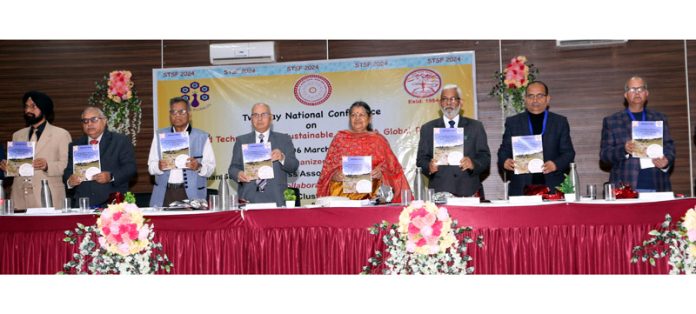Excelsior Correspondent
JAMMU, Mar 5: A two-day National conference on “Science and Technology for Sustainable Future: A Global Perspective”, a collaborative venture by Jammu Chapter of Indian Science Congress Association (ISCA), School of Sciences and MAM College was organized here today at Cluster University of Jammu.
The inaugural ceremony was witnessed by a galaxy of luminaries from all the three collaborative organizations in the presence of the chief guest of the occasion, Prof Vijay Lakshmi Saxena (immediate past president, ISCA), chief patron Prof Bechan Lal, Vice Chancellor, Cluster University of Jammu (CLUJ), Prof AK Sexena, former president ISCA, Prof MK Jyoti, member executive committee ISCA, Prof Kuldeep Sharma, member executive council ISCA, patron of the conference Dr Jatinder Khajuria, Registrar CLUJ, Prof JS Tara, convener ISCA Chapter Jammu, Dr G S Rakwal co-patron, Dr Ranvijay Singh, conference convener and DSW CLUJ, and Dr B B Anand, Principal of the College.
An insightful welcome address was presented by Prof Bechan Lal while Dr Ranvijay Singh highlighted the thematic concerns of the conference. Prof J S Tara shared chronological history of the journey of ISCA right from its inception. The abstract book of the conference was also released by the eminent dignitaries present.
Prof Vijay Lakshmi Saxena, in her address opened new vistas of sustainable development and urged the audience to imbibe scientific acumen and ensure sustainable goals for developmental endeavours in order to handover the legacy of nurturing mother Earth to our next generation.
Dr Bharti Salathia, Head Department of BBA conducted the proceedings of the conference while vote of thanks was delivered by Dr B B Anand.
The inaugural ceremony was followed by three parallel technical sessions chaired by Prof Baldev Sharma (JU), Prof Kamal Kapoor (JU), Dr Rajesh Thaper, Consultant Pharmaceutical Industry and Prof Jighar Mohammad (JU).
Another informative and interesting invited talk was presented by OP Sharma “Vidhayarthi” (Retired IFS) on different types of “Ecosystems and Diversities” particularly of J&K and Ladakh UTs with special emphasis on the flora and fauna going to be extinct.


